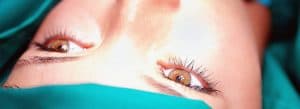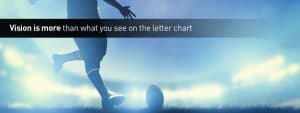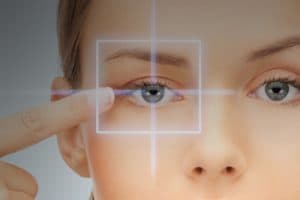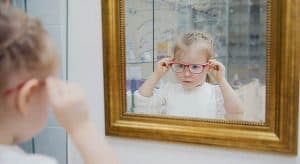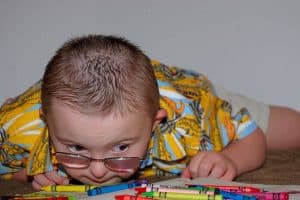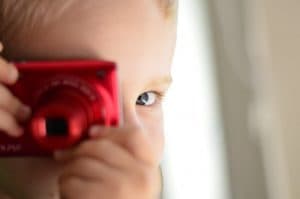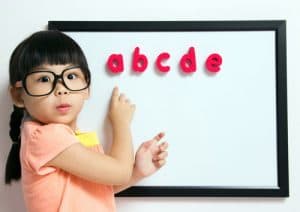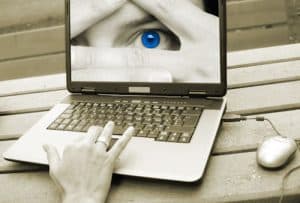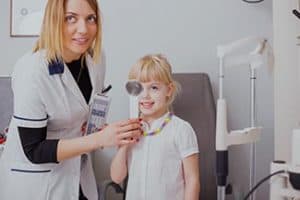Vision Therapy for Autism: Success Stories
Personal stories of children with autism who completed vision therapy for underlying vision problems. *Names have been changed for privacy protection. Click here for a
Read MoreCan Adults Have Convergence Insufficiency?
Convergence insufficiency (CI) is a common vision condition that affects up to 17 percent of children and adults. While CI is generally diagnosed in children
Read MoreDouble Vision (Diplopia)
Each year, approximately 850,000 visits to the doctor and emergency room are associated with double vision. Double vision, medically termed diplopia, can be very worrisome.
Read MoreStrabismus Surgery
What is strabismus surgery? Strabismus, also known as “crossed-eyes” occurs when the two eyes are unable to achieve proper alignment to focus on an object.
Read MoreHow Is Convergence Insufficiency Diagnosed?
Do you often lose your place while reading? Do words on the computer screen seem blurry? Do you suffer from frequent headaches or eye discomfort
Read MoreCan Glasses or Eye Patches Treat Convergence Insufficiency?
If you have been diagnosed with convergence insufficiency (CI), or are experiencing symptoms of CI, you may be wondering how CI is treated. Any type
Read MoreDo I Have Convergence Insufficiency?
Wondering if convergence insufficiency (CI) is impacting your school or work performance? Take this quick quiz to find out. People with CI often experience blurry
Read More7 Signs Your Child Might Have a Lazy Eye
Do you know the signs to look for to identify lazy eye in your child? A lazy eye is generally difficult to recognize because it usually develops in only one eye, without a noticeable eye turn. It is important to be aware of the signs that may indicate a lazy eye, since in most cases, the condition is not recognized easily – though it can significantly affect a child’s quality of life.
Read MoreDyslexia FAQs
Q: What is dyslexia? A: Dyslexia is a complex condition that impacts the way the brain processes and interprets information. It is one of the
Read MoreConvergence Insufficiency FAQs
Q1: What is convergence insufficiency (CI)? A: Convergence insufficiency is a highly treatable binocular vision condition that affects near vision and eye muscle coordination. Convergence
Read MoreVision and Learning Difficulties FAQs
These are the ten most frequent questions asked to vision therapy eye doctors.
You may easily find answers to your questions. If you still have questions, contact your nearest eye doctor experienced in children’s vision and vision therapy.
Vision for Basketball
Many have dreamed of netting a 3 pointer the way Stephen Curry can— but did you know that strong visual skills are needed to land
Read MoreVision for Football
Did you know that Larry Fitzgerald, 11 times pro-bowl receiver of the Arizona Cardinals, attributes his success to vision therapy? Football is a sport in
Read MoreVision for Ice Hockey
Your visual skills can affect your ice hockey performance. Wayne Gretzky, known as the “The Great One”, is the leading scorer in NHL history, with
Read MoreVision for Soccer
Soccer skills are dependent on your physical stamina, legs and feet … and also your eyes. Soccer is played in over 200 countries, making it
Read MoreVision for Tennis
Tennis players need speed, endurance, flexibility, and agility to be successful in the game. Did you know that tennis players also need excellent visual skills?
Read MoreVision for Golf
Strong visual skills are vital for optimal golf performance— from seeing your target, reading a putt, and even visualizing your swing? Your ability to play
Read MoreVision for Baseball
If you think that hitting that 100 mile per hour fastball out of the park is all about athletic genes or natural abilities, what you
Read MoreDoes Dyslexia Affect Adults?
Recent data shows that 1 in 10 adults have dyslexia and adults with dyslexia typically experience many challenges in the workplace and many adults also have low self esteem as a result of their dyslexia. Vision therapy has been shown to lead to improved reading, writing, and spelling. Vision therapy could be the solution you have been lookin for.
Read MoreWhat is Sports Vision?
Do you feel like your sports performance does not measure up to your athletic ability? You may be suffering from a vision problem, a vision problem may actually be causing the difficulty you are experiencing while participating in sports activities.
Read MoreDigital Eye Strain
Digital eye strain (DES), also known as computer vision syndrome (CVS) affects over 50 percent of people, including both children and adults. Symptoms fall into two main categories: those linked to accommodative or binocular vision stress, and external symptoms linked to dry eye.
Read MoreWhat is Myopia Management?
Myopia management has shown to decrease myopia progression by up to 78%. Myopia management is a treatment program to keep the level of myopia as low as possible, and reduce your risk of developing a serious sight-threatening eye disease. Myopia management can involve the use of eyeglasses, contact lenses, and eye drops— all scientifically proven to aid in the control of myopia progression.
Read MoreVision Therapy for Adults
Vision therapy is a proven and effective solution for adults as well as children.
Do you feel like your work performance is impacted by headaches or eye strain?
Are you finding it stressful to meet deadlines?
Vision therapy is a remarkably effective program that improves vision skills to achieve more comfortable vision for reading and computer use – enhancing your workplace productivity.
Optical and Contact Lenses
Buying your new pair of eyeglasses can be fun. The quality and range of lenses are always increasing. Considering contact lenses or laser surgery?
Read MoreExophoria and Esophoria
Has your child been diagnosed with exophoria or esophoria? Both of these may appear as an eye turn, and can be successfully treated with eyeglasses and/or vision therapy.
Read MoreHypertropia or Hyperphoria?
Hypertropia and hyperphoria are when the eyes are misaligned – one pointing higher than the other. Both these forms of eye turn can be well managed by optical lenses and vision therapy, often avoiding eye surgery.
Read MoreVision Therapy FAQs
We are sure you have many questions, these FAQs are the most frequently questions asked by patients and parents to vision therapy eye doctors.
Find answers to your questions quickly and easily.
A Guide to Children’s Eye Diseases
As your child grows older, annual exams are crucial to ensure that their eyes continue to develop normally, and to detect any changes in vision or ocular health. Importantly: vision screenings conducted by schools are not a substitute for a comprehensive eye exam – ocular diseases and many vision problems cannot be identified through a screening.
Read MoreVision Therapy for Children
Are your child’s school grades not a true reflection of their potential? Has your child been told they have a learning or attention difficulties?
The problem could be with their eyes or visual skills and vision therapy might the solution you have been looking for.
Multifocal Designs for Children
Your eye doctor may have prescribed multifocal lenses for your child, but are multifocals only for adults? Multifocal lenses are generally prescribed for adults who have blurry near vision, and complain of reading difficulties due to lack of vision clarity, however eye doctors are also prescribing these lenses for children.
Read MoreWhat Are ‘Low Plus’ Lenses?
Why did your eye doctor prescribe ‘low plus’ lenses for your child? Low plus lenses, like their name suggests, have relatively low lens powers usually +0.50, +0.75 or +1.00. These powers are considered ‘low’, but may have a considerable benefit for your child’s reading and school grades.
Read MoreConvergence Insufficiency
Convergence Insufficiency (CI) impacts the lives of up to 15% of all students. This is a highly treatable binocular vision condition that affects near vision and eye muscle coordination.
Children with CI can be mislabeled as ‘lazy’, ‘clumsy’, ‘poor students’ and ‘anxious’, or even misdiagnosed with ADHD and dyslexia.
Essential Vision Skills for College Students
Strong visual skills are essential for academic success in college
College students have significantly high demands on their visual systems— and the integrity of their visual skills are critical for their success in their studies. Colleges and universities are known for their large lecture halls and seemingly endless amount of requirements. The great amount of studies that are involved in fulfilling these requirements lead to many hours of reading textbooks, studying, and using computers – all requiring excellent visual skills.
Read MoreFragile X Syndrome
Over half of the Fragile X Syndrome (FXS) population suffer from visual problems – most commonly eye turns, lazy eye and poor eye muscle control. FXS is the second most common chromosomal-based developmental condition after Down Syndrome and is estimated to occur in over 1 in 10,000 children.
Read MoreVision and Vestibular Dysfunction
Do you often experience dizziness or feel as though the world is spinning around you (vertigo)?
Do you experience motion sickness, or a persistent sense of unsteadiness or imbalance? You may have an inner ear disturbance called Vestibular Dysfunction. The good news is that these symptoms can be significantly reduced with vision therapy, allowing you to regain your quality of life.
Vision and Sensory Processing Disorder
Have you been told your child has a sensory processing disorder (SPD)? Sensory processing disorders (SPD) can be life-changing, but many eye doctors can now offer you a range of options to best manage your child and allow them to maximize their engagement with the world.
Read MoreVision and Non-Verbal Learning Disorder (NVLD)
Guide to Non-Verbal Learning Disorder (NVLD). NVLD can significantly impact a child’s life, however many eye doctors can provide the solution you have looking for.
Read MoreVision Problems from a Brain Injury
Can a brain injury cause vision problems? Yes, any traumatic brain injury (TBI) can have significant visual consequences. During the initial treatment of a concussion or other traumatic brain injury (TBI), visual problems are often overlooked. Frequently, visual problems are hidden or neglected— lengthening and impacting rehabilitation.
Read MoreVision and Gifted Learning Difficulty
Have you been told your child has Gifted Learning Difficulty (GLD)? GLD can be a mystery— how can a child be gifted intellectually, yet still experience learning difficulties? The answer often lies in the diagnosis of a vision problem, most commonly caused by poor visual skills.
Read MoreVision Therapy Quiz
Could a vision problem be impacting your child’s school performance?
Take a quick quiz to find out.
Take a quick quiz to see if your child could benefit with vision therapy. If your child is not performing to their academic potential, they may be suffering from a vision problem. According to experts, up to 50 percent of children with learning difficulties have a vision disorder that is impacting their ability to learn.
Read MoreConvergence Insufficiency and ADHD
This page provides just two of the many research papers that link Convergence Insufficiency (CI) with ADHD. 1. The Relationship Between Convergence Insufficiency and ADHD
Read MoreLazy Eye: Success Stories
Read some real-life stories from patients who have successfully completed vision therapy for lazy eye. *Names have been changed for protection of privacy.
Read MoreVision Therapy for TBI Related Vision Conditions
How does a TBI affect vision? Vision is the most important source of sensory information. Consisting of a sophisticated complex of subsystems, the visual process
Read MoreCommon Vision Problems Associated With a Brain Injury
Over 10 million traumatic brain injuries (TBI) occur annually, worldwide. Approximately 2.8 million, close to 1 in 100, Americans suffer a form of TBI every
Read MoreVision Therapy for Traumatic Brain Injuries: Success Stories
Below are stories from children and adults who have suffered a traumatic brain injury (TBI) and their experiences with Vision Therapy. *Names have been altered
Read MorePost Trauma Vision Syndrome
A Guide to Post Trauma Vision Syndrome Author: Dr. Allen Cohen OD, FCOVD Dr. Cohen is currently Clinical Professor of Optometry, SUNY State College of
Read MoreVision, Dizziness and Imbalance
Many people experience dizziness or balance issues following a mild concussion or other traumatic brain injury (TBI). Dizziness or imbalance can be caused by a
Read MoreVision and Brain Injuries
Can the eyes and visual system be affected by a brain injury? Yes, Traumatic brain injury (TBI) can result in significant vision problems, unfortunately these often remain undiagnosed for years, dramatically impacting the quality of life.
Read More5 Essential Facts About Traumatic Brain Injuries
Have you suffered a brain injury? Here are 5 facts that are essential to know: A traumatic brain injury (TBI) is an injury to the
Read MoreHow Does a Traumatic Brain Injury Cause Vision Problems?
Brain injuries can lead to vision problems, especially in children. We often think of a Traumatic Brain Injury (TBI) affecting adults, however consider these facts:
Read MoreNAACP: Vision and Learning Statement
NAACP Passes Resolution on Vision, Learning, and High-Risk Populations at its 100th Anniversary National Convention, New York, NY 2009 PR Newswire, September 29, 2009 Charles
Read MoreWhat Is ADHD?
Attention deficit hyperactivity disorder (ADHD) is one of the most common behavioral disorders among children. ADHD behaviors generally interfere with academic and social success and cause many difficult challenges. Over four million American children – up to 11 percent of school age students – are diagnosed with ADHD.
Read MoreEye Conditions That Cause Strabismus
Many common eye conditions can lead to an eye turn. Eye turns affect over 3 people in 100 and can be successfully treated by eye doctors, often without needing complex eye surgery.
Read MoreA Teacher’s Guide to Vision
As an educator, it may surprise you to discover that many students that show signs of a learning difficulty actually have an undetected vision problem. Teachers play a vital role in the future success of their students and are the most qualified professionals to notice any learning problems in the classroom. “It is estimated that more than ten million school age children suffer from vision problems that may cause them learning difficulties in school.” (National PTA)
Read MoreStrabismus FAQs
Q: Is strabismus surgery the only treatment option for an eye turn? A: No. Strabismus treatment options depend on the type of strabismus— direction of
Read MoreMy Lazy Eye Was Misdiagnosed
“Thanks to Vision Therapy, I Gained 3D Vision!”. A Personal Story by Rachel Cooper, Past Director of the Optometrists Network.
Read MoreParent’s Checklist to Identify a Vision Problem
Is a vision problem impacting your child’s academic success or athletic performance?
Did you know that vision problems affect up to 25 in every 100 children – that’s at least six students in every class.
This checklist can be a useful tool for you to understand all of the behavioral and physical symptoms that your child is experiencing, and may help to facilitate the identification of a vision problem.
How Does Vision Affect Learning?
Since up to 80% of everything a child learns is derived through the visual pathways and their eyes, if there is any interference in their vision, a child may not develop to their maximum potential. There are 17 visual skills that are essential for learning.
Read MoreHarvard Statement: Vision and Literacy
‘Vision and Literacy: An Educational Problem that can be Solved’ Published by the Harvard Graduate School of Education (2001) On Tuesday, April 4, 2001, a
Read MoreVision Therapy for Convergence Insufficiency: Success Stories
Real-life stories from parents of children who have successfully completed a vision therapy program for the treatment of Convergence Insufficiency. *Names of the children and
Read MoreEffective Treatment for Convergence Insufficiency
Clinical research study shows the effectiveness of vision therapy for the treatment of Convergence insufficiency (CI). Convergence is an essential visual skill for success in
Read MoreVision Therapy: Evidence-Based Research
Vision therapy is an evidence-based treatment modality. Do you want to see a list of references for published research articles on vision therapy and its effectiveness? Some of the references are available as links to original published research or complete articles in PDF format.
Read MoreVision and Learning Difficulties
Approximately 80 percent of all learning comes through the visual pathways. Any interference in the visual pathways can inhibit a child from performing to their maximum potential. According to the American Optometric Association (AOA) 25% of all children, or 1 in 4 students, have a vision problem significant enough to impact their learning.
Read MoreShould I See an Optometrist or Ophthalmologist?
Your eye care team Ophthalmologists, optometrists and opticians are the three main professionals included on the ‘eye care team’. While each profession plays an important
Read MoreVision and Down Syndrome
The frequency of Down Syndrome (DS) is approximately 1 in every 800 births, with an increased frequency among older mothers. With the specialized improvements in the quality of eye care individuals with DS can live a more productive, longer life. Individuals with Down Syndrome (DS) are at a higher risk for a range of vision conditions that may affect the development of their visual skills.
Read MoreVision and Special Needs
If you are a parent of a special needs child, then by now you have realized that nothing fully prepares you for this unique journey. Public school data in the USA now shows that up to 14 percent of all public school students ages 3 to 21 receive special education services.
Read MoreWhat Is Lazy Eye?
According to research, amblyopia affects up to 1 in 33 of the population— this means up to 10 million people in the U.S. may have a lazy eye. Amblyopia, commonly known as a “lazy eye”, is a neuro-developmental vision condition that begins in early childhood and develops when one eye is unable to achieve normal visual acuity, causing blurry vision in the affected eye, even with corrective eyewear. The condition also commonly presents with poor depth perception, and reading difficulties.
Read MoreDoes My Child Have Dyslexia?
Has your child been diagnosed with Dyslexia? Since up to 80 percent of learning in school is acquired through vision, a child diagnosed with dyslexia may actually have an undiagnosed vision problem, causing difficulties with their academic performance.
Read MoreHow Is Lazy Eye Treated?
A variety of treatment options have been shown to treat lazy eye – the aim is to strengthen the eye-brain connections necessary for binocular vision. Traditionally, it has been thought that lazy eye treatment should begin before a child reaches around eight years old, however recent research shows that even after this age, lazy eye can be successfully treated. That being said, the earlier the condition is diagnosed, the better the treatment outcome will be.
Read MoreWhat Is Exotropia?
Exotropia is a common form of strabismus characterized by an outward eye turn, away from the nose. Exotropia is a eye turn where one eye points outwards, this may be noticed while the child is looking at distance objects, near objects or both.
Read MoreWhat Is Esotropia?
Esotropia is a form of strabismus (crossed-eyes) that is caused by an inward turn of the eye, toward the nose. This condition can be constant or intermittent and cause an individual to appear ‘cross-eyed’.
Read MoreWhat Is Vision Therapy?
Vision therapy is a fully customized and personalized treatment program designed to improve and strengthen visual skills, and re-train the child’s visual system to interpret visual input with increased accuracy and ease.
Vision therapy is more than just simple eye exercises — it improves brain-eye communication, and the effective operation of the child’s visual system.
The aim of vision therapy is to enhance the visual skills — eye-tracking, focusing, convergence, eye-hand coordination, visual processing speed and more!
The 17 Key Visual Skills
There are 17 essential visual skills for success in reading, writing, sports, and practically all of a student’s school activities. Vision therapy can help to strengthen the visual skills – and may be just be the solution you have been searching for.
Read MoreDigital Eye Strain: Myths and Facts
Digital eye strain (DES), also known as computer vision syndrome (CVS) affects over 50 percent of people, including both children and adults. In recent years,
Read MoreADHD and Vision: Recent Research
Recent research has shown that ADHD behaviors may actually be a result of vision problems. If your child is fidgety, hyperactive, or distressed by his schoolwork, you may think that a diagnosis of ADHD is obvious. In the last 15 years, many clinical trials have been published and show that many vision problems can affect your child in the same way as an attention deficit disorder. Vision problems can be effectively treated, often without medications.
Read MoreEye Exams for Children
Eye doctors utilize specific clinical and diagnostic tools and assessments to determine your child’s eye health and visual abilities. Since many learning skills are dependent on the strength of visual skills such as binocular vision, accurate eye movements, the ability to see distant objects, etc., doctors recommend that children have their first eye exam at age 6 months.
Read MoreVision and Autism (ASD)
Visual problems can have a large impact on the life of a child with austism (ASD). Vision problems are common in children with ASD, but unfortunately these often go undiagnosed.
Read MoreDoes ADHD Cause Social Problems?
Sometimes children with ADHD don’t fully understand what is expected of them in social situations. Children with ADHD usually encounter many obstacles in school, finding it difficult to succeed in their studies. Many children with ADHD face difficulties in reading or math, organization, focus, as well as their attention challenges.
Read MoreCan Vision Problems be Misdiagnosed as ADHD?
While many children with ADHD have 20/20 vision, they may still suffer from vision problems that affect their ability to learn. Functional vision difficulties can produce similar symptoms to those found in ADHD. These visual problems can lead to skipping lines, confusing words and word-order, etc. – making it impossible for the child to read accurately and efficiently.
Read MoreADHD and Vision: Success Stories
Real life stories from parents of children diagnosed with ADHD – when a vision problem was an underlying issue and was successfully managed with a personalized program of vision therapy. *Names have been changed for privacy protection.
Read More



